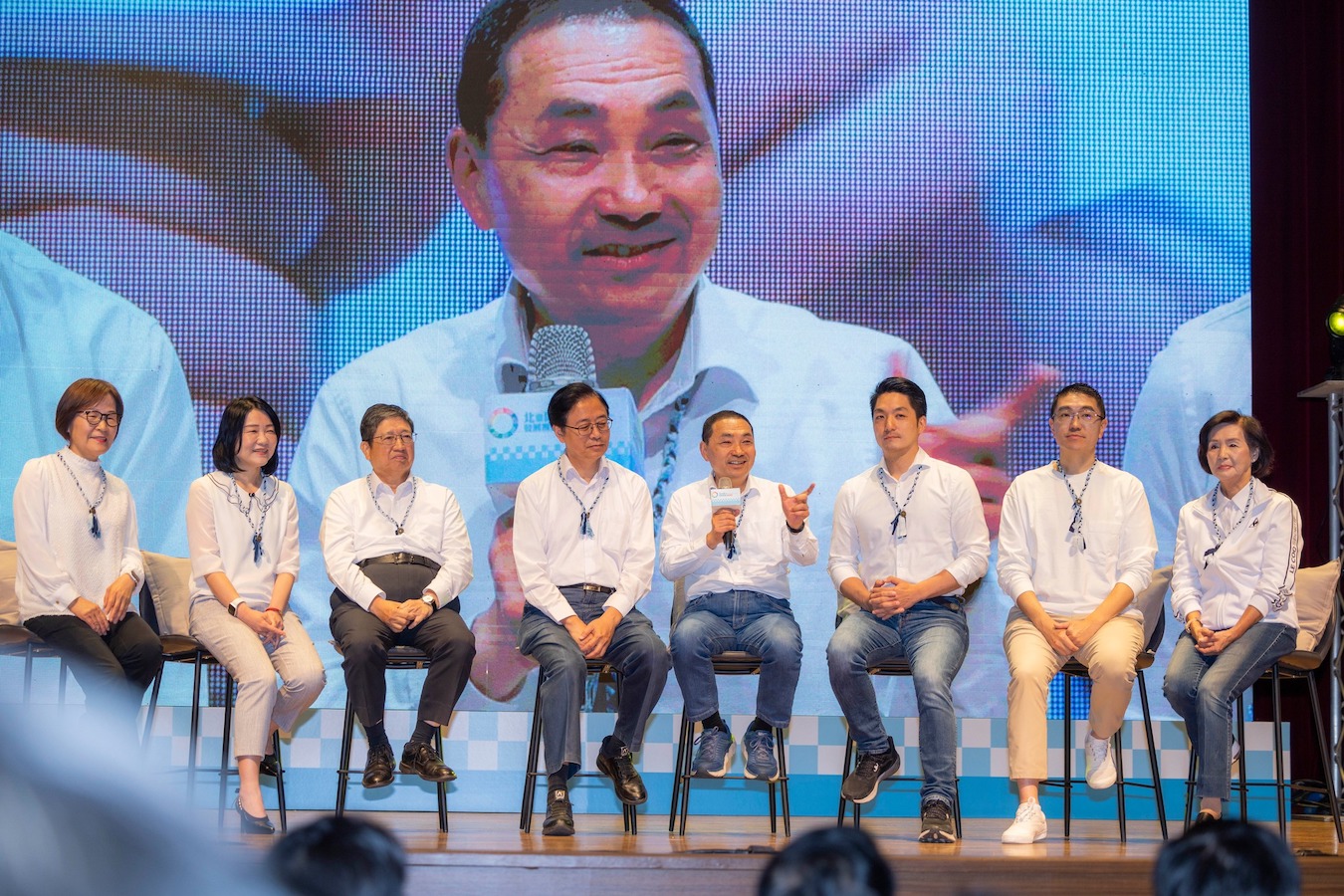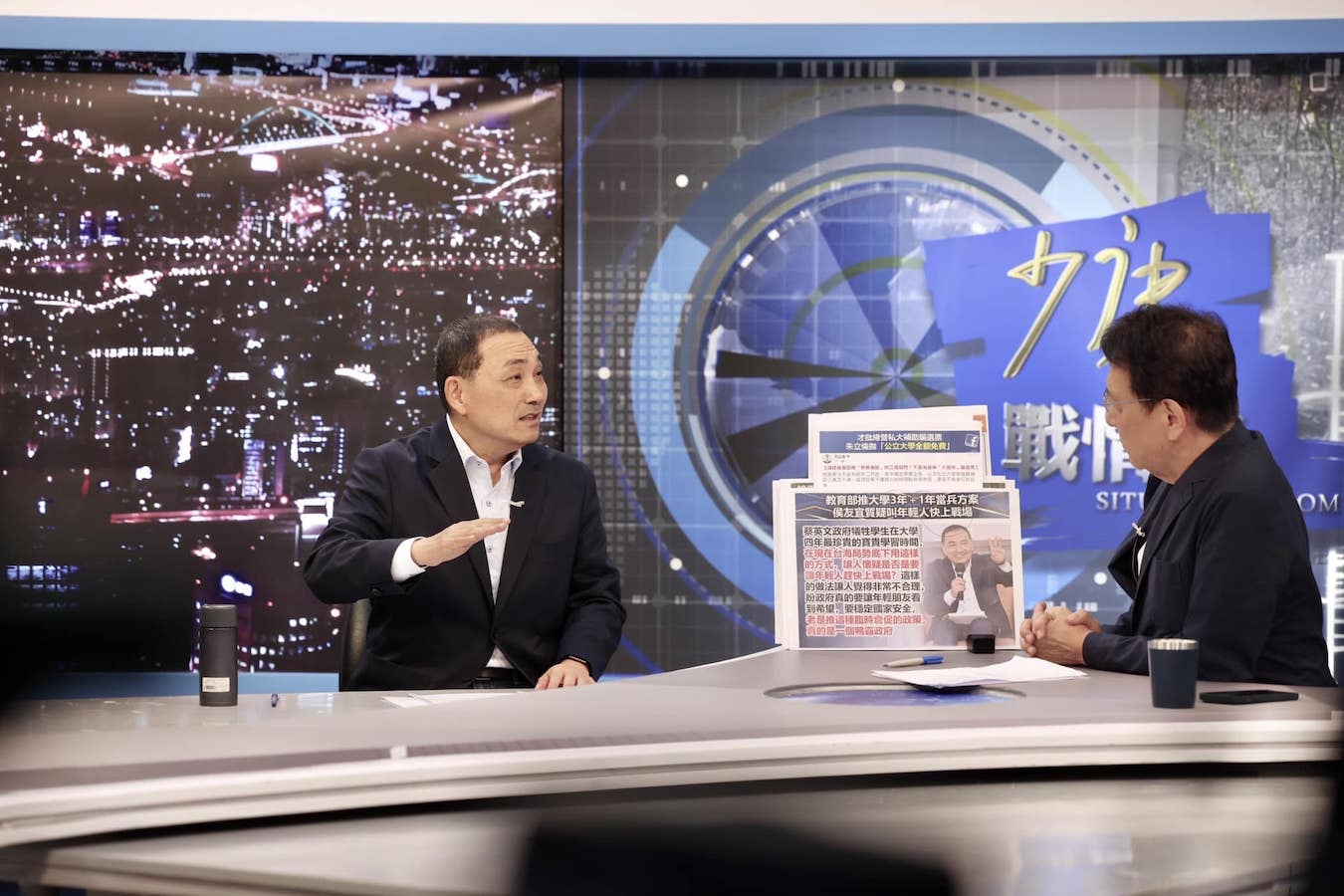by Brian Hioe
語言:
English
Photo Credit: Hou You-yi/Facebook
KMT PRESIDENTIAL CANDIDATE Hou You-yi proposed to lower the military draft earlier this week, suggesting that the draft should again be lowered to four months. The military draft was re-extended to one year by the Tsai administration in December of last year, with the draft having been lowered to four months by the Ma administration.
During the Ma administration, the draft was lowered to four months for those born after 1994 in 2012. It is not accurate that the draft was lowered to four months for all individuals, seeing as those born before 1994 still had to serve one year for the draft. With the re-extension of the draft to one year under the Tsai administration, men born between 1994 and 2005 will continue to serve a four-month draft, while those born after 2005 will serve a one-year draft.
The draft originally began to be lowered during the Chen Shui-bian presidency. However, historically, men born in the ROC have had to serve in the military for between two and three years. Chen began lowering the draft during his presidency for electoral purposes.
 Hou You-yi (center-right) and other KMT politicians. Photo credit: Hou You-yi/Facebook
Hou You-yi (center-right) and other KMT politicians. Photo credit: Hou You-yi/Facebook
Nevertheless, Hou’s idea does not seem to have gained much popular traction. Polling from My-Formosa suggests 72.7% of Taiwanese support re-extending the military draft. As such, Hou walked back these comments earlier today, stating that he did not oppose re-extending the draft to one year and that he supported Taiwan continuing to purchase arms from the US.
Firstly, Hou’s proposal to undo the Tsai administration’s draft re-extension would in part be to try and score points among younger voters. This is a demographic that the KMT has struggled with in the past years.
Two years ago, the KMT reported less than 9,000 members under 40. In the two years since then, the KMT claims that recruitment is up 40%, though this still means that the party likely has less than 15,000 members under 40.
Likewise, at present, the TPP’s presidential candidate, former Taipei mayor Ko Wen-je, is polling higher than Hou You-yi. It is generally thought that Ko enjoys the support of a number of young people–certainly, he enjoys the support of a voter base that does consist of a greater share of young people than that of the KMT, even if it is unclear how this compares to the DPP.
Nevertheless, Hou’s proposal to undo the draft extension was a form of leaning into the peace versus war narrative that the KMT is leaning into for the 2024 elections. In particular, the KMT has sought to frame the DPP as a provoking war with China through an ideological commitment to independence and a refusal to engage with China. In turn, the KMT has sought to frame itself as a party of peace, in calling for a return to policies of economic engagement with China.
This has drawn to some extent from narratives in international political discourse that emerged after Russia’s invasion of Ukraine. As with the framing that Ukraine provoked Russia through facilitating closer relations with NATO and the US, the KMT has sought to frame the DPP’s successes in strengthening ties between Taiwan and the US, as well as European countries, as having been unnecessarily provocative of China.
Indeed, one notes that Tsai herself cited the Russian invasion of Ukraine, as well as China’s live-fire exercises around Taiwan in August of last year, as indicating the need to re-extend the military draft. China launched an unprecedented series of live-fire exercises around Taiwan in August, following the historic visit to Taiwan by then-US Speaker of the House Nancy Pelosi, who was the first US Speaker of the House to travel to Taiwan in a quarter of a century.
 Hou You-yi (left) and Jaw Shaw-kong (right). Photo credit: Hou You-yi/Facebook
Hou You-yi (left) and Jaw Shaw-kong (right). Photo credit: Hou You-yi/Facebook
Yet in light of Hou now walking back his stance, Hou’s announcement of plans to again lower the draft may have been seen as a quick and cheap move against the Tsai administration and was easily framed as advocacy for complacency in the face of rising threats against Taiwan.
Lowering the draft also can be framed as denigrating the military in some form, when the KMT has historically depended on veterans as a solid base of support and the KMT has increasingly leaned into militaristic nostalgia as part of campaigning in past years. Such groups were likely to view the military draft as a rite of passage for young men that they often went through themselves, rather than as a move provocative of China. That is, Hou trying to nix the Tsai administration’s draft extension would have maybe found favor among young people, but it likely would not have been a key issue for a significant chunk of the KMT’s core demographic.
It is to be seen whether Ko Wen-je of the TPP will follow suit in making similar campaign promises. Ko already succeeded in pushing Hou into an endorsement of the CSSTA after floating the idea, then ambiguously backing away from it when he was criticized for reversing course from his opposition to the CSSTA in 2014. And so, it is to be seen whether Ko embraces the idea of undoing the DPP’s extension now that Hou has apparently dropped the idea. Certainly, neither politician wants to be perceived as simply lifting ideas from the other.

